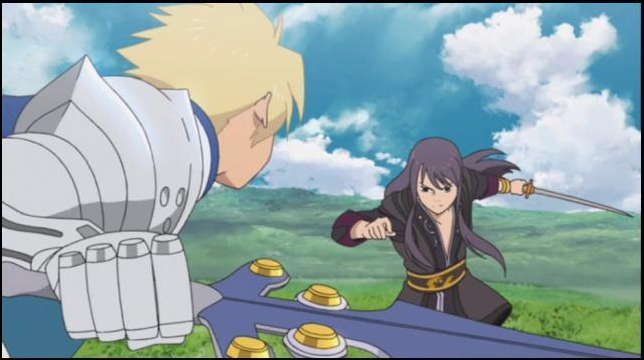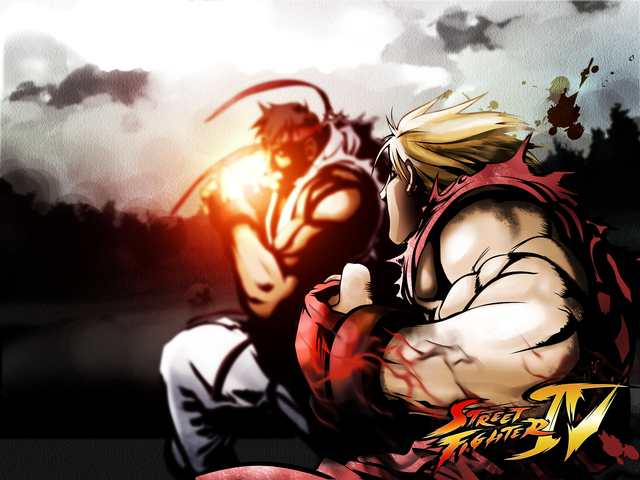Rivalry Ribaldry
By Mento 3 Comments
One of the more interesting relationships formed between two characters is that of the rivalry. It's always an ambiguous dichotomy of animosity and respect; there's never an occasion where the two are in perfect concord, nor are they the bitterest of enemies. I'm going to explore the rivalry as a literary device that games, like any fiction, might utilize to develop a complex relationship between two of the more important characters in the piece. I'll then go on to extend the rivalry concept to features that are found solely in video games. After which, I will probably stop starting these articles with an explanation of what I'm doing, because that's getting totally old, you guys.

In Tales of Vesperia, the two roles of the rivalry is that of protagonist Yuri Lowell and his childhood friend Flynn Scifo. Yuri's always taken matters into his own hands, unable to stand idly by while people around him suffer. Because of this impetuous and reckless attitude towards justice, he's constantly in trouble with the authorities and it even later mutates into a Punisher-esque vigilantism which threatens to turn him into the very type of villain he's gunning for. Flynn, meanwhile, is able to suppress his dissatisfaction with the Empire and his superiors in the Imperial Knights, aiming to solve the bigger problem at the expense of many smaller ones. As he raises through the ranks due to a mix of popularity and competence, he edges ever closer to being in a position where he can make real change, and is patiently following orders until that day comes. By any practical metric for governing this sort of thing, Flynn is the hero, and this is emphasized by the use of colour with the two characters: Yuri is dark-haired and wears dark, commoner's clothing, while Flynn is blond, blue-eyed and decked in increasingly ostentatious gleaming white armor befitting his rising station in the Imperial Knights. However, Yuri is quick to criticize the increasing ease with which Flynn is able to ignore the ignominy, often giving the scrupulous knight pause. Their meetings remain prickly throughout, though it's evident some element of their close friendship persists regardless.

This isn't a unique relationship, though the directions the story takes those characters is certainly fresh. Two other video game relationships, where a pair of childhood friends later develop different ideological stances to combat a greater injustice that eventually sees the two of them oppose each other, include: Riou and Jowy Atreides of Suikoden II, leading to a split between the two where the former becomes the leader of the Unification Army and the latter becomes a rising figure in the opposing Highland Kingdom. Again, both characters have the same goal and are of a similar moral alignment, but have very differing opinions on how best to resolve the war. Likewise, the friendship between Ramza and Delita of Final Fantasy Tactics becomes strained and later broken as the latter becomes more and more hungry for power to change things for the better after the death of his sister at the hands of fascistic nobles, crossing the moral event horizon a few times in the process. In the type of ironic twist that former Square designer Matsuno was fond of invoking, Delita is historically revered as the hero of that particular war for his efforts in uniting the Kingdom of Ivalice under his rule, with the infinitely more virtuous Ramza all but forgotten.
Another spin on the rivalry connection is that of two very talented, competitive people who can't leave the question of which is better well enough alone. This is perhaps the most basic cause of any rivalry - needless to say that the video game protagonist construct, which is predicated on some kind of unusually strong talent that the player assumes, will meet others with an equally prodigious talent in that field, some of which end up fixated on competing with the protagonist.

This leads to many a recurring boss in video games: Going back to Vesperia, the raging psychopath and Leviathan's Claw enforcer Zagi is roundly trounced by Yuri after mistaking him for Flynn, which then evolves to a competitive hatred with Yuri that manifests a handful more times as the game progresses, usually with Zagi getting ever more desperate and augmented by experimental, hazardous technology. Wild ARMs 3 has Janus Cascade, a rival bounty hunter that also slowly loses his humanity as he becomes ever more consumed with the rivalry. Slightly less dark but still as antagonistic relationships include that of your ever-present rivals in the Pokemon games, starting with Gary Oak (though, as a recent Wiki editor kerfuffle has proven, is not necessarily the same character from the original Pokemon games). There's the unscrupulous Star Wolf who, despite clashing with the Star Fox team on many an occasion, begrudgingly treats the team with enough respect to the extent that they will work alongside them to fight a greater evil. Other rivalries are merely alluded to without any further context, generally around a simple theme, such as that between the capital-letter switching Mario and Wario or the fire-based Scorpion and ice-based Sub-Zero (which is given a little more elaboration regarding rival ninja clans, but not so much to be remarkable). And, of course, the most famous video game rivalry of all: Ryu and Ken.
In terms of game-unique implementations of a rivalry conflict, we have: The mirror matches of fighter games, where the player is on equal footing with an identical CPU opponent, which is an intriguing metaphysical concept born serendipitously from designers needing to boost the limited number of opponents for the player to fight. Likewise, a doppelganger fight where the opponent is able to perfectly mimic the player character can be daunting from an existential standpoint, where the player must deal with the idea that the computer can do their job but better. Shadow Link is perhaps the best example of this, making his debut as the chief antagonist of the already challenging Zelda II: The Adventure of Link as a sword-wielding dillettante (so a fillettante?) who is almost impossible to beat fairly.

Honestly, I could go forever with rivalries between video game characters. It's probably the format's most ubiquitous relationship after that of the hero and princess, or that between a spaceship and another, eviller spaceship. As always, I want you guys to please feel free to talk about your favorites: What are some cool rivalries that are particularly memorable, either in their in-game execution or how layered and complicated the game deigns to make that relationship?
And now, locked in the eternal rivalry between not being able to draw and not being able to write jokes, it's...
BONUS COMICS!
Okay, so all I played this week was Vesperia again. With that in mind, I'm doing something different with the comics this week. Specifically, my interpretation of playing the newer Tales games compared to the older ones, and how I feel they've changed and evolved. Observe:

Here we have the 2D LMB system I'm used to. Used in Phantasia, Destiny and Eternia, this 2D system is easy to follow and plays out much like you'd expect: The front line attackers keep enemies busy while the ranged support fires spells and arrows from the safety of the rear. Simple. Elegant.

And here we have how every 3D LMB system game seems to go down for me. Everyone has their roles, assigned on the Tactics tab, but the fights themselves become utterly anarchic almost immediately. One could vouch for the verisimilitude (which is apparently a word I have to use in every blog now) of how disorderly actual battles generally are, but it feels harder from a gameplay perspective to co-ordinate your party if they're running around the place like a bunch of headless chickens. Whatever, I'm probably too old to wrap my head around this insanity. I'm off to yell at clouds or whatever it is old people do. Until next week, everyone.
